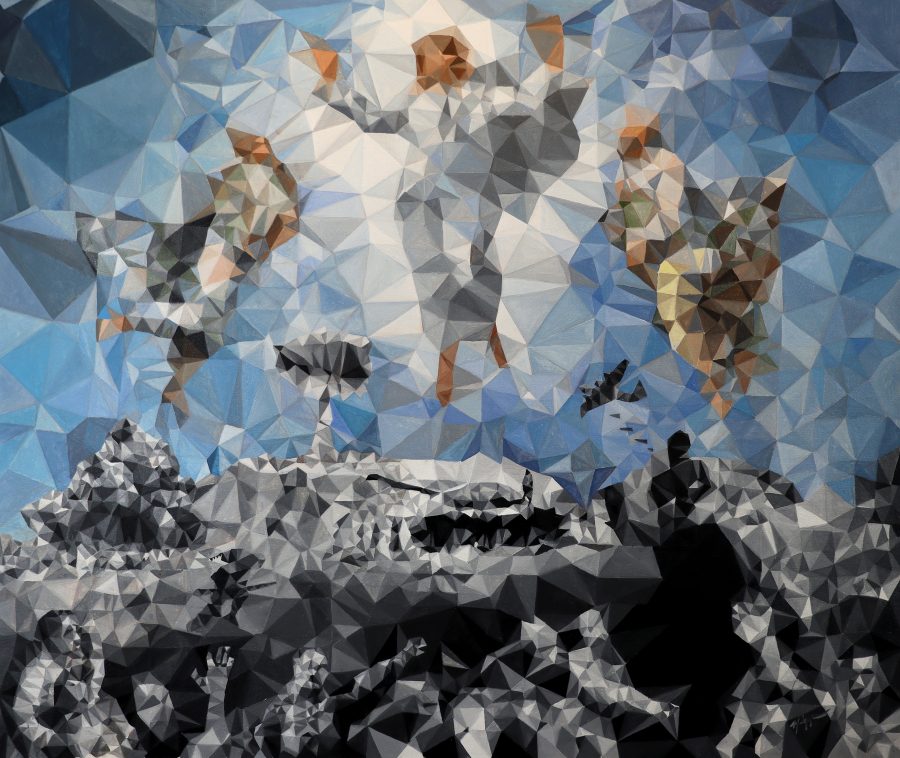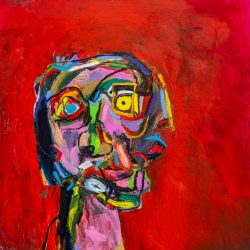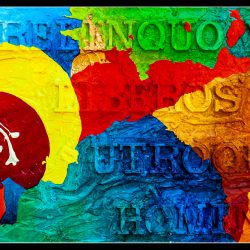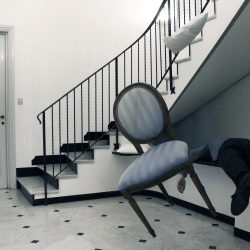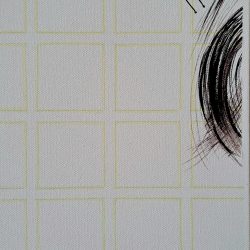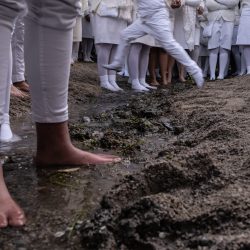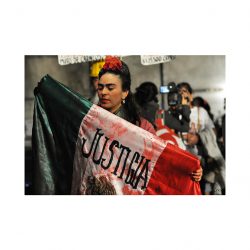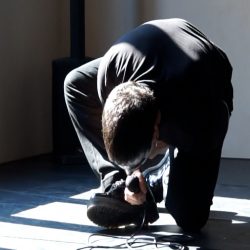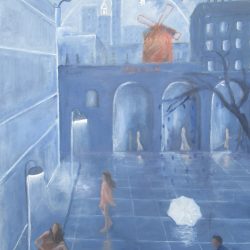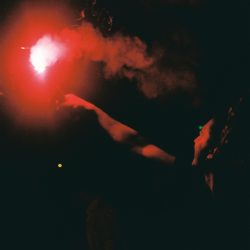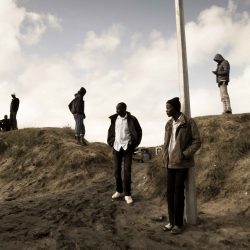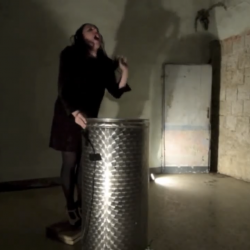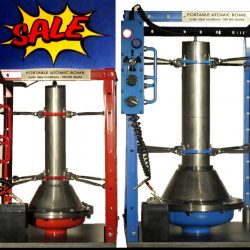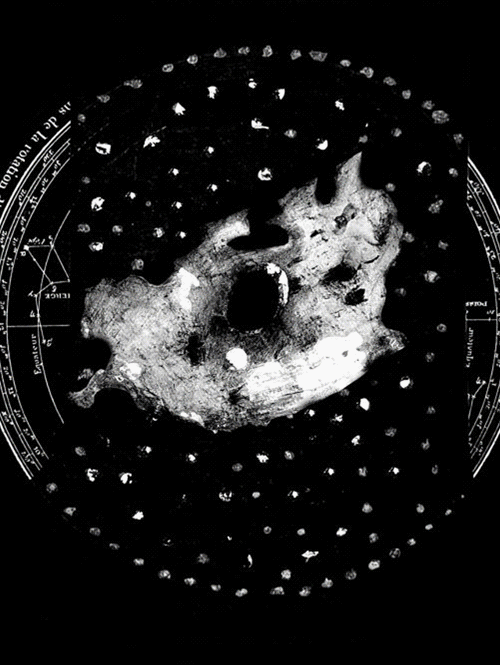work
Lc 1,37
| category | Painting |
| subject | Political / Social |
| tags | artesacra, futuristico, decompose, geometrico, sintetico, figurativo, astratto, oliosutela, scomposizione, cubismo, classic |
| base | 120 cm |
| height | 100 cm |
| depth | 3 cm |
| year | 2024 |
Decompose, Oil on canvas, unique work.
Lc 1.37 from the series “Decompose”
Targa Instagram Premio Arte 2024
The concept of “fragmentation” characterizes the modern era, our time, our choices or non-choices.
Cutting our roots with the Western Christianity of the Middle Ages because it was obsolete, closed, rigorous, made of laws and deprivations, will lead to multiple rebellions and protests in the various decades and consequently to a crisis of the foundations.
Modernity is characterized by the concept of “fragmentation”, which arises from the crisis of the foundations. Ancient society, which had very solid foundations, was characterized by unity, since the foundations that were at its base provided a unitary direction for the lives of individuals.
Modern society, on the other hand, is characterized as the first society whose foundations have disintegrated. Modern society opens, conceptually, with Nietzsche's famous aphorism "The Mad Man" (The Gay Science, aphorism no. 125). It tells of a prophet who enters the market, where merchants buy and sell, and begins to shout that God is dead and we are all his murderers. The merchants mock him, since the market is the place where those who do not believe in God are. The market is therefore the symbol of modernity, since it introduces the concept of fragmentation.
What we live in today is a very complex, fragmented era, full of contrasts and contradictions where, for example, extreme poverty and extreme wealth coexist at close range and the struggle for survival and enormous waste are two tracks that will never cross. Everything is dictated by the market, by power and by money.
"All wars are fought for money". Socrates
The work “Lc 1,37” created for the 2024 Art Award, takes inspiration from the great master Raphael in the transfiguration of Christ.
We are faced with one of the greatest moments of Revelation in which the two natures, human and divine, coexist. In the original work we find two passages from the gospel: that of the transfiguration, obviously, where Moses and Elijah appear together with Christ and converse together while the apostles, humans, tremble with fear and collapse to the ground and from above we hear the voice of God saying: “This is my beloved Son: listen to him!”
The second gospel represented in the lower part of Raphael's masterpiece is that of the young man suffering from the lunaticus disease where the disciples try, in vain, to free him from the demon that possesses him and only Christ who came down from Mount Tabor will be able to free him.
In the work Lk 1,37 the divine upper scene in which Christ appears transfigured remains unchanged except for its “decomposed” draft. In the lower part, in chromatic contrast with the upper one, the new narrative scene of a probable evolution of that second passage of the gospel develops. In fact, if we observe the painting starting from the left we still find the possessed youth of the original work who introduces the story of human suffering, there is an outstretched hand as a sign of truce and an outstretched hand of the Fuhrer as a signal to unleash the most important genocide in history, further to the right a figure who from his horse is ready to strike a sword blow or throws another desperate signal of a raised hand, further to the right another desperate signal of a raised hand, a little further up on the left we find bombings in Baghdad, then again the explosion of the atomic bomb in Hiroshima, further to the left a boy on a tank playing at knocking down a classical building in Kharkiv (Ukraine) as if to represent the destruction of culture and beauty and again fighter-bombers dropping bombs that will raze entire cities to the ground killing children and the elderly without distinction. These are some of the scenes represented given the horrors of war and the choices of men who invaded by the sense of power and who unlike God, unable to dominate it will bring human existence to catastrophic consequences reducing the value of life to a victory or a defeat in battle.
"And the battle has just begun there are many losers, but tell me who won the trench is dug in our hearts and mothers, children, brothers, sisters torn apart" Sunday Bloody Sunday, U2 - 1983
From “fragmentation” to “decomposition” as a contemporary representation of our time, a classical interpretation that is concerned with destroying and putting the pieces back together at the same time and the perception of a beauty that is disappearing, decomposing a work by Raphael is a violence, an act of denunciation, but also the awareness that art continues and evolves, but how? It becomes virtual, digital, non-fungible token and also artificially intelligent, a mathematical calculation of data and information in which we all firmly believe and that will make us do better and in less time. Hence the desire to stop time and tell the story of today with the technique of oil painting, aiming to create an ancient and modern work at the same time. The choice of the subject was born from a stimulus that was suggested to me by an important person, who told me: “do what you consider essential, leave everything superfluous alone”. This sentence led me to reflect and called me to a “responsibility” on the message that I can convey with art, a sense of “duty” and that if art is a gift that was given to me (from above) then I must share it and it must be done in the best way!
The strong message hidden in the title is that life is a wonderful gift and that man cannot replace God and that nothing is impossible for God, even stopping wars, if man allows it.
That illusion of omnipotence that in history has led man to want to be God has generated great catastrophes. Food for the ego that elevates to a “status optimum” that is an end in itself, without altruism, conscience, love or humility. A destructive, possessive power in antithesis to everything that is vital, dedicated and sacrificed for the other as only a true God is able to do.
Even in our microcosm where there are no missile attacks we live daily conflicts caused by money, power, envy, revenge, domination. After all, we are at war every day inside our hearts too but we can do something in our small way and lose a part of our self to add it to the you.
*Between 2005 and 2022 according to the United Nations - at least 120,000 children were killed or maimed because of wars.
In the world there are at least 7 active wars in 2024:
Libya, Yemen and Syria - Azerbaijan and Armenia - Ethiopia - Afghanistan - Russia and Ukraine - Sudan - Palestine and Israel.
Lc 1.37 from the series “Decompose”
Targa Instagram Premio Arte 2024
The concept of “fragmentation” characterizes the modern era, our time, our choices or non-choices.
Cutting our roots with the Western Christianity of the Middle Ages because it was obsolete, closed, rigorous, made of laws and deprivations, will lead to multiple rebellions and protests in the various decades and consequently to a crisis of the foundations.
Modernity is characterized by the concept of “fragmentation”, which arises from the crisis of the foundations. Ancient society, which had very solid foundations, was characterized by unity, since the foundations that were at its base provided a unitary direction for the lives of individuals.
Modern society, on the other hand, is characterized as the first society whose foundations have disintegrated. Modern society opens, conceptually, with Nietzsche's famous aphorism "The Mad Man" (The Gay Science, aphorism no. 125). It tells of a prophet who enters the market, where merchants buy and sell, and begins to shout that God is dead and we are all his murderers. The merchants mock him, since the market is the place where those who do not believe in God are. The market is therefore the symbol of modernity, since it introduces the concept of fragmentation.
What we live in today is a very complex, fragmented era, full of contrasts and contradictions where, for example, extreme poverty and extreme wealth coexist at close range and the struggle for survival and enormous waste are two tracks that will never cross. Everything is dictated by the market, by power and by money.
"All wars are fought for money". Socrates
The work “Lc 1,37” created for the 2024 Art Award, takes inspiration from the great master Raphael in the transfiguration of Christ.
We are faced with one of the greatest moments of Revelation in which the two natures, human and divine, coexist. In the original work we find two passages from the gospel: that of the transfiguration, obviously, where Moses and Elijah appear together with Christ and converse together while the apostles, humans, tremble with fear and collapse to the ground and from above we hear the voice of God saying: “This is my beloved Son: listen to him!”
The second gospel represented in the lower part of Raphael's masterpiece is that of the young man suffering from the lunaticus disease where the disciples try, in vain, to free him from the demon that possesses him and only Christ who came down from Mount Tabor will be able to free him.
In the work Lk 1,37 the divine upper scene in which Christ appears transfigured remains unchanged except for its “decomposed” draft. In the lower part, in chromatic contrast with the upper one, the new narrative scene of a probable evolution of that second passage of the gospel develops. In fact, if we observe the painting starting from the left we still find the possessed youth of the original work who introduces the story of human suffering, there is an outstretched hand as a sign of truce and an outstretched hand of the Fuhrer as a signal to unleash the most important genocide in history, further to the right a figure who from his horse is ready to strike a sword blow or throws another desperate signal of a raised hand, further to the right another desperate signal of a raised hand, a little further up on the left we find bombings in Baghdad, then again the explosion of the atomic bomb in Hiroshima, further to the left a boy on a tank playing at knocking down a classical building in Kharkiv (Ukraine) as if to represent the destruction of culture and beauty and again fighter-bombers dropping bombs that will raze entire cities to the ground killing children and the elderly without distinction. These are some of the scenes represented given the horrors of war and the choices of men who invaded by the sense of power and who unlike God, unable to dominate it will bring human existence to catastrophic consequences reducing the value of life to a victory or a defeat in battle.
"And the battle has just begun there are many losers, but tell me who won the trench is dug in our hearts and mothers, children, brothers, sisters torn apart" Sunday Bloody Sunday, U2 - 1983
From “fragmentation” to “decomposition” as a contemporary representation of our time, a classical interpretation that is concerned with destroying and putting the pieces back together at the same time and the perception of a beauty that is disappearing, decomposing a work by Raphael is a violence, an act of denunciation, but also the awareness that art continues and evolves, but how? It becomes virtual, digital, non-fungible token and also artificially intelligent, a mathematical calculation of data and information in which we all firmly believe and that will make us do better and in less time. Hence the desire to stop time and tell the story of today with the technique of oil painting, aiming to create an ancient and modern work at the same time. The choice of the subject was born from a stimulus that was suggested to me by an important person, who told me: “do what you consider essential, leave everything superfluous alone”. This sentence led me to reflect and called me to a “responsibility” on the message that I can convey with art, a sense of “duty” and that if art is a gift that was given to me (from above) then I must share it and it must be done in the best way!
The strong message hidden in the title is that life is a wonderful gift and that man cannot replace God and that nothing is impossible for God, even stopping wars, if man allows it.
That illusion of omnipotence that in history has led man to want to be God has generated great catastrophes. Food for the ego that elevates to a “status optimum” that is an end in itself, without altruism, conscience, love or humility. A destructive, possessive power in antithesis to everything that is vital, dedicated and sacrificed for the other as only a true God is able to do.
Even in our microcosm where there are no missile attacks we live daily conflicts caused by money, power, envy, revenge, domination. After all, we are at war every day inside our hearts too but we can do something in our small way and lose a part of our self to add it to the you.
*Between 2005 and 2022 according to the United Nations - at least 120,000 children were killed or maimed because of wars.
In the world there are at least 7 active wars in 2024:
Libya, Yemen and Syria - Azerbaijan and Armenia - Ethiopia - Afghanistan - Russia and Ukraine - Sudan - Palestine and Israel.



